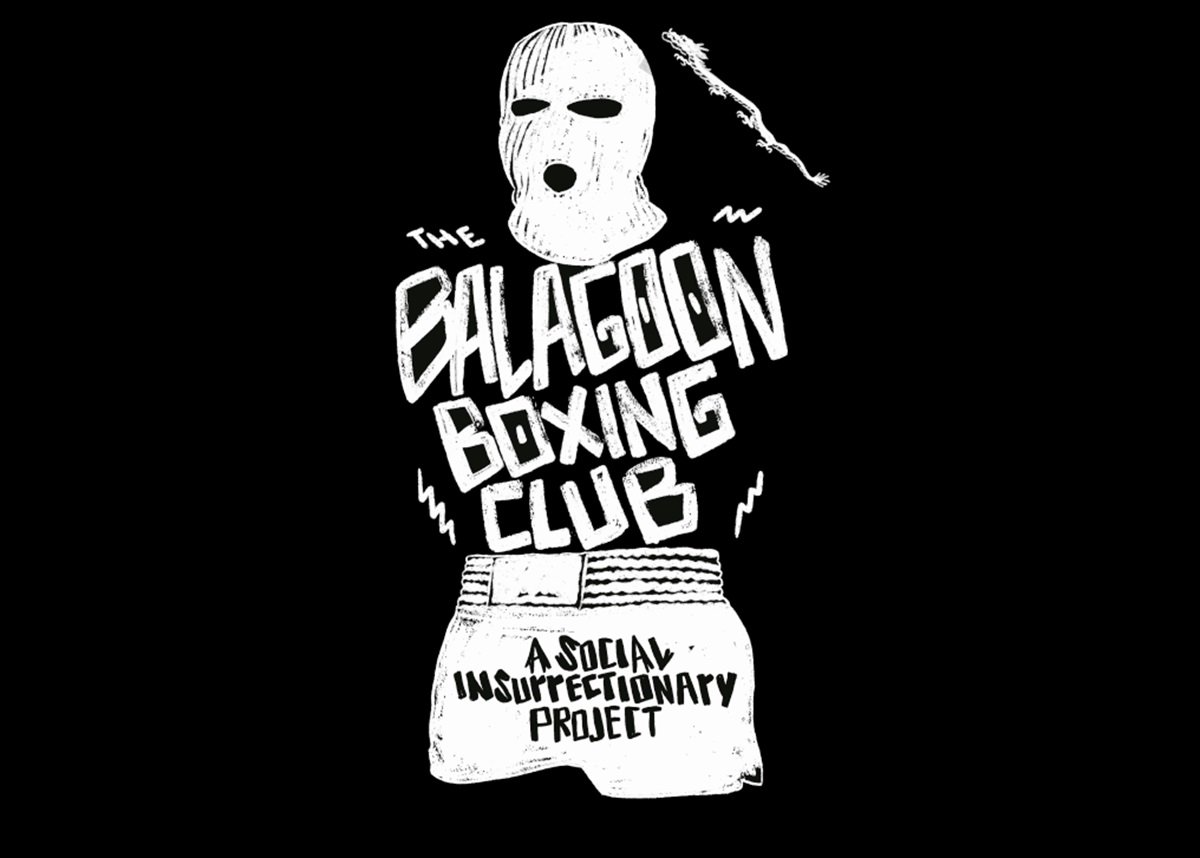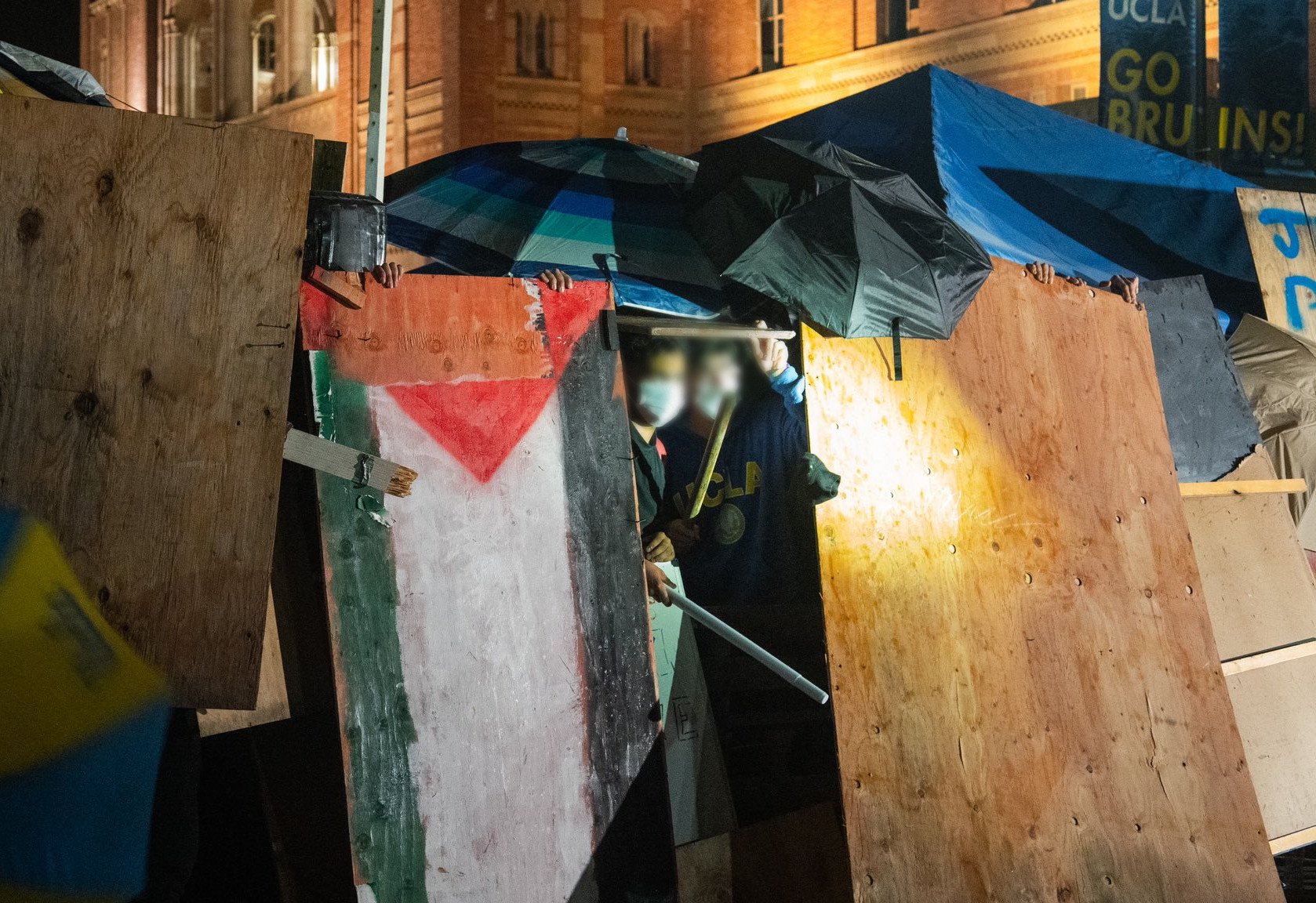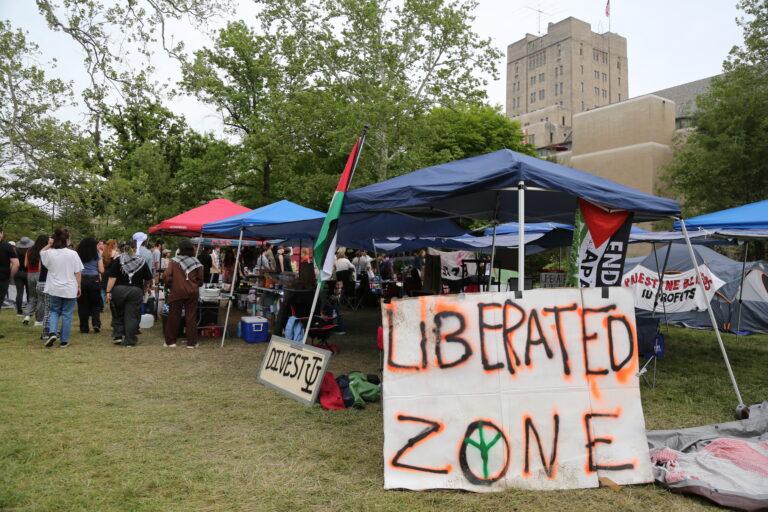Filed under: Featured, International Coverage

Robert Hurley, a long time translator who helped put into English the works of Foucault, Deleuze and the Invisible Committee, reports from the Tarnac Nine trial in France.
For ten years, a small group of people have been charged with terrorism for supposedly taking part in sabotage actions. Today it was announced that the vast amount of the charges were dropped, as the State lacked any evidence to convict the defendants on much of anything.
What follows are Hurley’s thoughts from viewing the trial as well as some collected quotes from those fighting the charges. With the J20 trial looking like it will likewise be dragged out for as long as possible as a form of collective punishment, hopefully both the resolve and the victory of the Tarnac Nine can serve as inspiration.
A week has passed since the trial. As I write, the ZAD is under violent revenge attack. We’re told that 2500 gendarmes with their militarized equipment have massed near Nantes, and the call has gone out: “If you’re able, come now!” Defend the Zone to Be Defended. Other actions are popping off all over France. Transportation strikes organized by the CGT, with good reason: Macron is squeezing workers and has a plan to privatize the SFCF, the national railroad. So now one recalls that trial, lasting a good month. It was really something. It was strange. A crazy trial, befitting the times. Dreamy crazy, a thing to wake up from, to flush out of one’s system. The verdicts will be announced on April 12. Who knows, but the signs are that they will be delivered like an afterthought, or a kind of politician’s apology.
“Our friends were investigated under an anti-terrorism policy that has globalized. Think J20, the Standing Rock trials…political trials all over the world. How far will the trend go?”
Where to start, since it’s finally finished. Well, all but one of the charges dated back to 2008! You remember, some peeps put rebar hooks on the high voltage overhead lines carrying electricity for powering the high-speed trains, some of which were carrying nuclear waste for disposal in Germany. Those hooks caught the connectors on the trains, which were stopped, therefore, some for several hours. Was it a blockage or a sabotage or both? Two of the comrades were charged with one instance of the latter, sabotage. But this was a trial of eight comrades. I may get this partly wrong, but all were charged with being something. What? Being malfaiteurs, wrongdoers, who conspired with criminal intent. What this amounted to concretely was planning a demonstration in Vichy that went black bloc. Am still talking 2008. Subsequently, two of the defendants committed the crime of refusing to offer DNA samples. Yes, that’s a crime in France.
Now then, “crazy,” I said. A single trial for all that and all those. It’s passing strange isn’t it? The conspiracy thing was meant to bind it together, but for that the court had to reach beyond the conventions of what they call “common law.” This gets interesting…and threatening, it has to be said. Because what it grasped with its manicured, democratic hand was sovereign law, the law of exception. True, there is a law on the books from the 1890’s devised to prosecute anarchist associations, later rescinded for it’s anti-democratic character, and re-instituted under Jacques Chirac in the late 20th. For us who are not naïve, however, the more salient fact is that our tiqqun friends were investigated under an anti-terrorism policy that has globalized. Think J20, the Standing Rock trials, the Bure (France) protests against the nuclear dump project there, the airport blockages in England, political trials all over the world. How far will the trend go?
The curious thing, however, in the “Tarnac case” is that the prosecution was prevented by other courts from proceeding with the “terrorism” label. No, they said, and repeated in appeals, this was definitely not terrorism. Consequently, the Tarnac judges in the Palais de Justice were put on the back foot at the start: they would have to decide solely on the basis of a fat dossier containing a record of operations conducted against the accused by anti-terrorism police. And the main prosecutor had a past in anti-terrorism courts. This situation must have been extremely uncomfortable for the liberal common law judges. One can put this discomfort more abstractly: it is very important for liberal jurisprudence, for the liberal state, to maintain that the police apparatus serves it and not vice versa. Most of us have given some thought to this, so it doesn’t need to be re-labored. The police force always risks going rogue. As it’s been said, the police apparatus is a poorly integrated remnant of sovereign power, a kind of war machine with its own dreams of general domination.
Now, we all recognize that the liberal, common-law court is a theater with its common script. Roughly, this retells the story of the social contract, which those brought before it are expected to absorb submissively, and merely plead that they have or haven’t broken one or more of the contract terms. If they are found to have transgressed, they are told in essence: “You must now undergo some corrective penalties, after which (if there is an after) you may re-endorse and re-subscribe.” In the Tarnac case, the script prepared by the police, the only one available to the court, was different because its hefty dossier told the story of an enemy group of co-conspirators bent on perpetrating rebellious mayhem and how they were surveilled, tracked, and eventually caught and brought to trial. Again the point is that the whole trial depended on that police dossier. The judges had nothing else to go on, apart from some texts that may or may not have been written by one or more of the defendants. And all the witnesses were cops. So for a month, the stuff of the trial, its material, was the information contained in police reports of police surveillance. In question were its quality and of course its truthfulness. In a sense, then, the intelligence police were as much on trial as the defendants, if not more so. The situation was excellent.
 Solidarity demonstration in the village of Tarnac.
Solidarity demonstration in the village of Tarnac.
One was tempted to empathize with the principal judge (“Madame la Présidente”). She was certainly no Julius Hoffman, of Chicago 7 infamy. Despite the work before her—she’s still working, I’m sure – she and her three female assistant judges trudged through the mountain of details with aplomb and a measured mood for the most part. One failing, however: at a certain point she broke into the proceedings to declare that Julien and Mathieu were the most “mal-élevés” – ill-mannered, ill-bred—persons she had ever encountered, which got her marked down several notches for class-arrogance. But on the other hand, you have to give her credit on some suspect ledger for announcing at the start that the defendants would be allowed to speak freely. Which they did, and how. On reflection, I think this was a kind of forced move on her part. She must have felt called upon to display the liberal mind that voices respect for what it calls “freedom of speech”, since she was in uncomfortable closeness with what can be called police mind, you dig it?
How much to tell? It would take a Tom Hayden and I’m not like him, rest his soul. The trial was inordinately focused on a certain night of sabotage near the Marne River not far from Paris. It so happened, surprise, that on that night a crew of intelligence cops were following Julien and Yildune, and they entered into the dossier a sketchy record of their police doings on that night. They felt that our couple were up to something but they had no idea what. I don’t know, man. There were time gaps; the cops didn’t have their iPhones with them. No, they suspended the tracking of the car when Julien and Yildune left the “scene.” They couldn’t really see because of obstructions, and didn’t see J. and Y. leave the car. Sloppy things like that.
“We don’t need empathy. What we’ve done during these ten years is what we know how to do: fight.”
Well, the fact was that J. and Y. were some three hundred yards from the sabotage site. So they must have done the deed? But there was no evidence. As things transpired, a couple of months later, the state got around to hiring some divers who were able to pull up from the river some lengths of PVC pipes that surely were used to hoist up the rebar hooks onto the train line wire. Those PVC pipes were placed on the floor in front of the judge’s platform for us to see. Never mind that said pipes had managed to sit in the water through two major river floods that accelerated the current to a speed you can imagine. Etcetera etcetera.
Julien and Yildune’s story is altogether different… and charming. They knew they were being followed that night but for once it didn’t matter to them. They were meandering through the countryside in a fog of love. You know how it is, you’ve been there. Any countryside will do, it’s all very perfect. Not finding a room at the local inn they drove on a ways and found a lane, thought they had shaken the police, so parked the car and made love. Slept it off for a minute, drove back to the metropolis. Simple as that. A new friend of mine, Jonathan from New Zealand said something pertinent about the sabotage. Something to the effect that when you think it through, you realize that such actions don’t really have authors. They are bound to happen almost of themselves. How could there not be attempts to halt something as egregious as nuclear power generation with its wastes that are dangerous for a hundred thousand years?
I won’t go on, unlike the trial which did go on and on. At the moment I remember Benjamin asking the judge: “Do you really think I am able to feel any culpability for refusing to give my DNA? And in connection with a charge that was dropped?”
There are many other cool things that were said by our destituent assembly. I’ll copy a few of them into this piece, below. The quotes are approximate. Like as not, the verdicts will be announced before you read this. There are grounds for expecting the happiest outcome. Actually, the prosecutor abandoned the conspiracy angle, as I understand it. He told the judges that there was no justification for calling the defendants a group. They were not one. We’ll see.
Quotes:
It’s been a thousand years that this palais de justice is here, that individuals have suffered in these halls. They lead you on a leash like a dog, to face a judge. It is dizzying. Who are they, these people?
The simple fact of not hanging one’s head, of defending oneself, is taken as an unspeakable gesture that adds to your culpability. And the fact of denying the allegations is an act of perversity!
The whole French criminal procedure comes from the rather rapid integration of the Inquisition’s practices into the State apparatuses. There was blood, and this was troubling. The Church preferred that the State handle that side of things.
***
The state prosecutor has made an ideological mistake. He has said, “I am not your enemy.”
I think the prosecutor has played his role well. What is remarkable is the way he has constantly lied.
In Hebrew “Satan” means both “prosecutor” and “Satan.”
***
“Peaceful demonstration, unruly demonstration.” If we are here today it’s because on a certain July 14, 1789 people rioted and even attacked a prison. By saying this, I am not praising riots.
***
One way to relate to this case is the institution: “If I don’t convict them it’s the institution that loses…” That’s the logic that led the SDAT* to go all out, to drop any restraint. *Sous-direction Anti-terroriste
What has insinuated itself here is the deep irrationality that lies at the heart of state policy, la raison d’État.
We haven’t practiced a defense of rupture here. We haven’t insulted the court; we’ve replied to your questions. You must have noticed that we haven’t made any martyrological declarations about the bourgeois justice system.
***
The peculiarity of this trial is that the judicial apparatus has come up against people who are prepared to defend themselves and determined not to let themselves be silenced. We are conscious of having had the chance to defend ourselves, of being able to speak, of having three weeks in which to do so. Because we’ve fought we have benefited from certain privileges. Having spent a little time in prison, I would like to dedicate this trial to all those who haven’t had to means to defend themselves, who are not listened to and who are convicted in silence.”
We don’t need empathy. What we’ve done during these ten years is what we know how to do: fight. Whatever the outcome of this trial, we will come out of it stronger. I think, Madame Présidente, that you will not have the capacity to judge us. The possibility of judging is a divine attribute. So unless one is God, judging is usurping. Moreover, a person would have to consider themselves judgeable, culpable. I am here because I refused to offer a DNA sample for a charge I have been cleared of. If you were really capable of judging me, you would pat me on the back and say, “You have fought well.” But you are not able to do that.
In the end you are less free than us. We can decline to play the game of justice, but not you. Even if from a human standpoint you know that all this is a farce, you’re institutionally, symbolically, constrained to see it through. You cannot really judge us, you can only try to save the institution.
***
We have held to this modest truth: you will not shut us up, not just us but also our friends, of whom there are many…
***
You were expecting terrorists. You’ve understood throughout these long weeks of the hearing, that the most singular thing about revolutionaries is what they have deeply in common.
In reality we have simply defended ourselves.
***
When you’re a woman, you’re upset and hysterical or if you’re calm you’re no fun, not playful. I have always been a number 2 in this affair…What matters to me is to go on working towards a transformation of the world.





